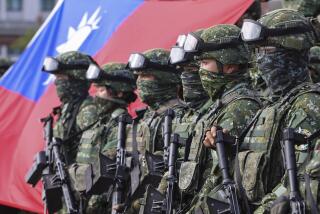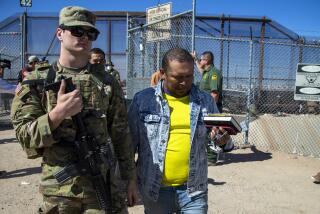Pentagon Will Reduce Air Patrols Over Cities
WASHINGTON — The Pentagon will scale back the combat air patrols flying over Washington, New York and other major U.S. cities since Sept. 11, but will maintain planes and crews ready to fly across the nation, officials said Monday.
Citing the high cost of the flights, the drain on Air Force resources and the unlikelihood that the patrols could deter another air attack on the U.S. homeland, officials said it is possible that patrols over New York will stop altogether.
“Combat air patrols in the air, even on Sept. 11, may not have made a difference,” a senior military official said. “What pilot is going to want to shoot down a civilian airliner? The Sept. 11 attacks, if they were going to be stopped, would have had to be stopped at the airports, not once the planes were in the air.”
The round-the-clock patrols have cost the military more than $500 million. They have tied up more than 260 aircraft--including fighters, AWACS radar control planes and C-130 transport planes--350 air crews and 10,000 Air Force personnel at 30 bases around the country.
The patrols were the first of their kind over the United States since the Cuban missile crisis in 1962.
In recent months, civilian awareness and safety conditions have sharply improved at commercial airports and aboard airliners, making the combat patrols a significantly less critical element of defense against terrorist attack, Pentagon officials said.
“We are talking about a different mix,” Defense Department spokeswoman Victoria Clarke told reporters. “And it will probably be . . . somewhat less than what you have had in the past.”
“We are looking at a plan that will employ some kind of mix of combat air patrols over certain locations, intermittent combat air patrols on an ad hoc basis, and different levels of strip alerts,” she said.
“Strip alerts” involve fighter planes ready to be scrambled for combat duty on 15 minutes’ notice.
Senior military officials said after the patrols were first announced that fighter pilots could be authorized to shoot down an airliner if there were an extreme threat, but they cautioned that utmost care would be taken before any such move.
New York’s Democratic senators, Charles E. Schumer and Hillary Rodham Clinton, questioned the decision to reduce the flights.
“There may be some logic to cutting the 24-hour air patrol over New York City while maintaining it over Washington, D.C.,” Clinton said. “But without any information, we don’t know what that logic is.”
In January, the Air Force’s top civilian official said the patrols--made up of F-15s and F-16s--were putting too much strain on the Air Force.
“That was never intended to be a permanent thing,” said Air Force Secretary James G. Roche.
In testimony last week before the House Armed Services Committee, Gen. Ralph E. Eberhart said more than 19,000 flights have been conducted in U.S. and Canadian air space in support of Operation Noble Eagle, the military’s name for the effort. Eberhart is the Air Force general in charge of the North American Aerospace Defense Command, which is responsible for the overflights.
Besides covering New York and Washington, other flights have taken place from time to time over other major metropolitan airports and critical security sites.
Clarke told reporters that President Bush had been briefed on the move, but she declined to say when it might go into effect. A senior military official said the move was imminent.
“This was from the beginning an ad hoc system put together after 9/11,” the official said. “Now we’re putting together a longer-term plan about how to conduct combat air patrols, and how to respond to threats in the sky. It’s no secret that our forces are stressed. It’s no secret that we need to look at options.”
More to Read
Sign up for Essential California
The most important California stories and recommendations in your inbox every morning.
You may occasionally receive promotional content from the Los Angeles Times.










